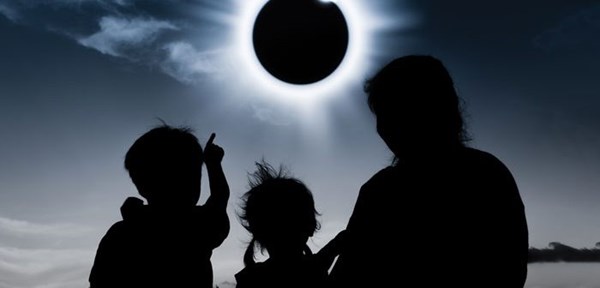One of my first editions as Editor-in-Chief of EM Resident featured a story about the fascinating history of space medicine. I loved this article not only because it introduced an exciting prospect for emergency physicians in space travel, but also because it took me for a ride down memory lane: to the carefree days of grade school when I wanted nothing else in life than to be an astronaut; to the days when I would build space stations out of Legos, make solar system dioramas, and beg my mother to buy freeze-dried spaghetti so I could get accustomed to a “space menu” (weird, I know).
While I eventually deviated from a career with NASA due to a somewhat peculiar fear of roller coasters and the Gravitron, my fascination with the cosmos has persisted. For that reason, I feel incredibly lucky to have witnessed the Great American Eclipse in totality on Aug. 21, 2017, at a single point along its continental path. It was unlike anything I have ever experienced.
As the moon approached complete effacement of the sun, the air became cooler and the mid-day light turned to dusk. Cicadas began to chirp, and a hospital courtyard full of individuals wrapped up in their own lives looked toward the heavens as one. To my left was a patient transporter with whom I joyously shared eclipse glasses. Behind me, a cardiac surgeon who appeared as if he had not slept in days. To my right, a pediatric cancer patient, her wheelchair parked by her IV pole. It truly was remarkable how many people had congregated for that rare glimpse of the solar corona.
There we all stood — together, in sheer awe, wonder, and humility — feeling equally insignificant and united in that moment of mystifying magnificence.
The timing of the total eclipse and its metaphorical significance could not have been more eerie. Historically, eclipses have been considered bad omens or harbingers of doom. And sure enough, while the sunlight returned within minutes, a much darker reality swept the country just days later in the form of two Category 4 hurricanes that made landfall in the same year for the first time in U.S. history. Meanwhile, wildfires raged throughout the American West, and Mexico experienced a magnitude 8.2 earthquake that proved to be the most powerful in over a century.
We will all experience times of extreme darkness and fear in our lives. Often it will be caused by forces and events completely out of our control. That pediatric patient and her family — how long had they been suffering? That patient transporter — was he going through the same type of agony that caused one of our own staff members to take his life weeks later? The cardiac surgeon — had he just told a family member one of their loved ones had died? Yet despite all of this — had they felt as I had in that moment? Like a microscopic piece of an unfathomable universe?
In my final year of residency, I have come to appreciate how important it is for us to experience such moments together — to ground us, to help us feel connected to each other, to be transiently blanketed in darkness together, to let go of our differences and remember how truly precious life is, and to know that at the end of this crazy journey, we are merely imperfect human beings who are much more alike than we are different. We are much more alike than we are different.
As I close my two-year position with EM Resident, I thank you, the writers and readers, who have helped me through some of my own darkest days by granting me a venue for introspection and healing — a constant reminder that while darkness may descend for a time, the light will always return. In that spirit, you have helped me find ways to illuminate the true miracles of life through your own stories, experiences, enthusiasm, and excitement.
I am forever grateful for my EMRA family and vow to continue appreciating these “life-defining” moments, together with you, and with our patients, as the Earth turns — 24 hours a day, 7 days a week, 365 days a year.



